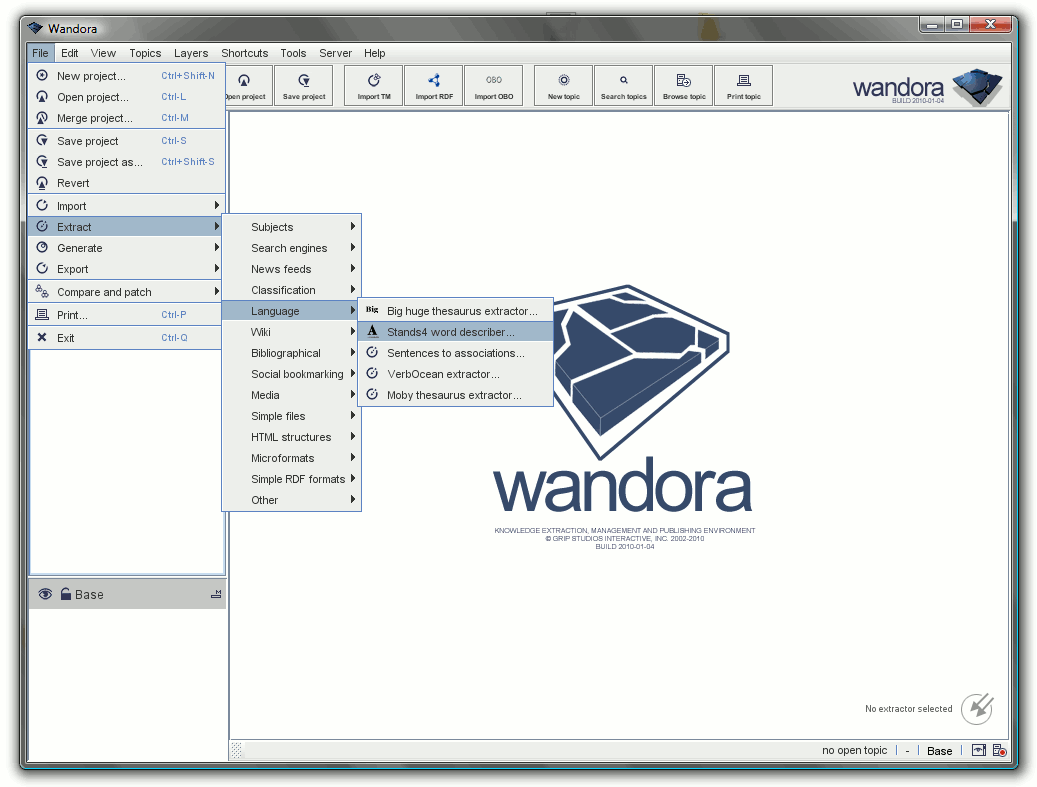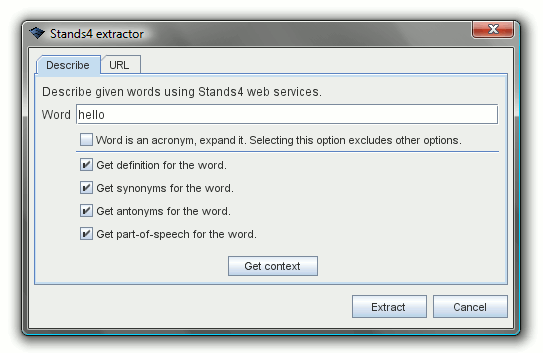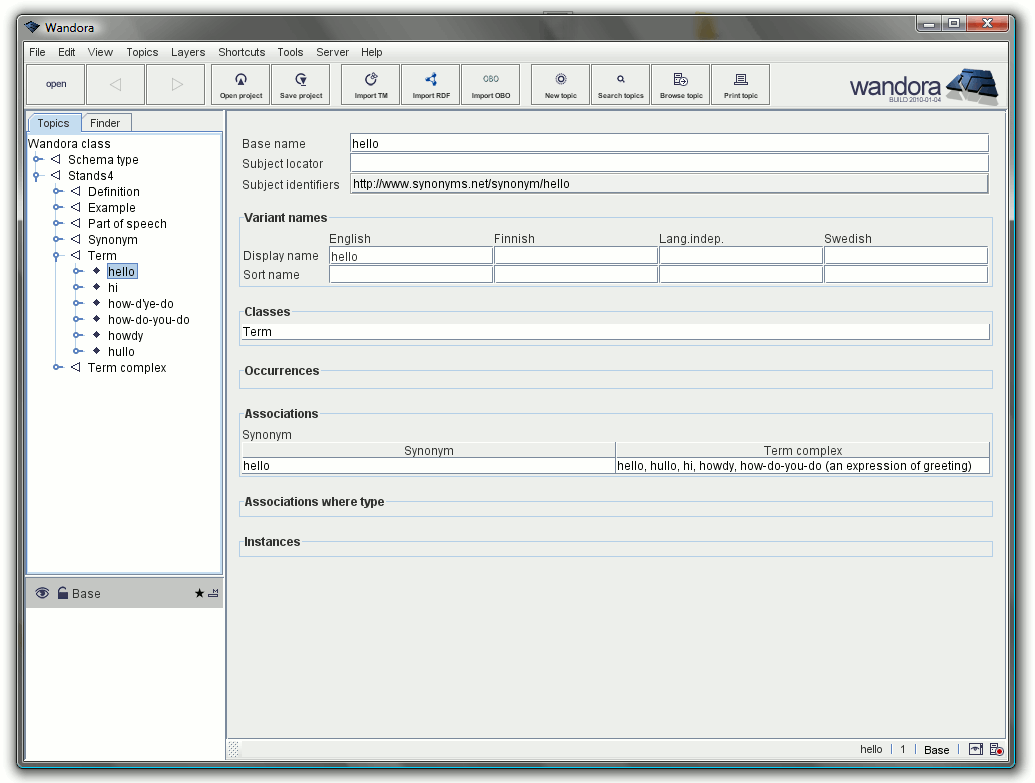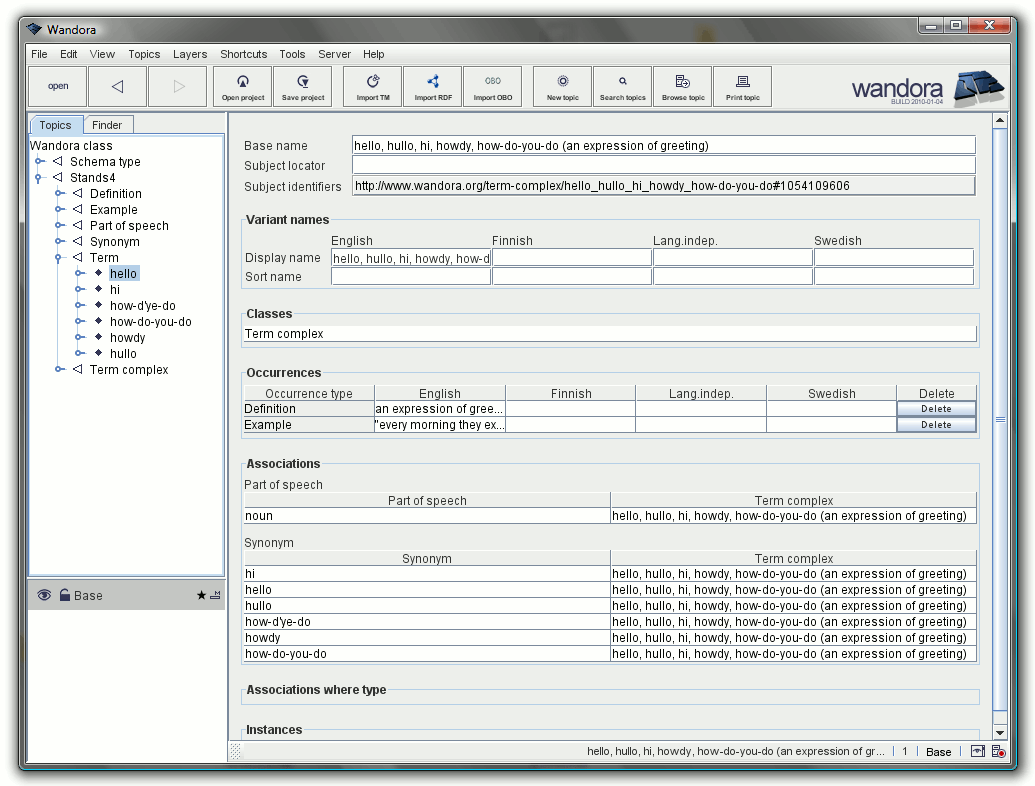Stands4 word describer
| Line 1: | Line 1: | ||
Wandora's '''Extract > Language > Stands4 word describer''' is used to describe given word with associations and occurrences provided by external web service [http://www.abbreviations.com/ STANDS4 API]. STANDS4 API provider, STANDS4 LLC is a leading provider of free online reference resources, serving millions of unique visitors worldwide with genuine content through its network of reference websites and content partners. Wandora's word describer requests a key for STANDS4 API. You can request your personal apikey [http://www.abbreviations.com/api.asp here]. Wandora doesn't store apikeys between use sessions. | Wandora's '''Extract > Language > Stands4 word describer''' is used to describe given word with associations and occurrences provided by external web service [http://www.abbreviations.com/ STANDS4 API]. STANDS4 API provider, STANDS4 LLC is a leading provider of free online reference resources, serving millions of unique visitors worldwide with genuine content through its network of reference websites and content partners. Wandora's word describer requests a key for STANDS4 API. You can request your personal apikey [http://www.abbreviations.com/api.asp here]. Wandora doesn't store apikeys between use sessions. | ||
| − | Describing associations are synonym, antonyms, and part-of-speech. Describing occurrences are definition and example. '''Stands4 word describer''' can also expand acronyms. What is interesting in STANDS4 descriptions, is the use of '''concepts''' or '''term-complexes''' as they are called in Wandora extractions. The idea is that describing, say a term '''hello''' doesn't describe generated term topic '''hello''' with direct associations to it's synonyms such as '''hi''' or '''howdy''' but a concept of '''"hello, hullo, hi, howdy, how-do-you-do (an expression of greeting)"''', and this concept is then associated to all synonyms. As noted above, Wandora calls these concepts as term-complexes. | + | Describing associations are synonym, antonyms, and part-of-speech. Describing occurrences are definition and example. '''Stands4 word describer''' can also expand acronyms. What is interesting in STANDS4 descriptions, is the use of '''concepts''' or '''term-complexes''' as they are called in Wandora extractions. The idea is that describing, say a term '''hello''' doesn't describe generated term topic '''hello''' with direct associations to it's synonyms such as '''hi''' or '''howdy''' but a concept of '''"hello, hullo, hi, howdy, how-do-you-do (an expression of greeting)"''', and this concept is then associated to all synonyms. As noted above, Wandora calls these concepts as term-complexes. This concept and term linkage is little different compared to a Wordnet, for example, which contains only terms. |
== Example == | == Example == | ||
Revision as of 23:09, 30 April 2010
Wandora's Extract > Language > Stands4 word describer is used to describe given word with associations and occurrences provided by external web service STANDS4 API. STANDS4 API provider, STANDS4 LLC is a leading provider of free online reference resources, serving millions of unique visitors worldwide with genuine content through its network of reference websites and content partners. Wandora's word describer requests a key for STANDS4 API. You can request your personal apikey here. Wandora doesn't store apikeys between use sessions.
Describing associations are synonym, antonyms, and part-of-speech. Describing occurrences are definition and example. Stands4 word describer can also expand acronyms. What is interesting in STANDS4 descriptions, is the use of concepts or term-complexes as they are called in Wandora extractions. The idea is that describing, say a term hello doesn't describe generated term topic hello with direct associations to it's synonyms such as hi or howdy but a concept of "hello, hullo, hi, howdy, how-do-you-do (an expression of greeting)", and this concept is then associated to all synonyms. As noted above, Wandora calls these concepts as term-complexes. This concept and term linkage is little different compared to a Wordnet, for example, which contains only terms.
Example
In this example Wandora user describes a word hello using Wandora's Stands4 word describer. First, user start the describer selecting menu option Extract > Language > Stands4 word describer as shown below.
Wandora opens up a dialog where user can enter the described word and options for description process.
Then user clicks Extract button. If user is describing his/her first word Wandora request an apikey for STANDS4 API. You can request your personal apikey here. Wandora performs an api call, receives a description for the hello, and transforms the description to Topic Maps structures, topics and associations.
Next Wandora user opens extracted topic hello as shown below.
Hello topic is associated to a term-complex called hello, hullo, hi, howdy, how-do-you-do (an expression of greeting) representing an expression of greeting. User double clicks the topic and it is opened to the topic panel of Wandora application as shown below.



